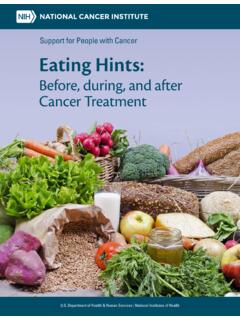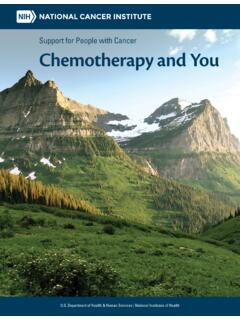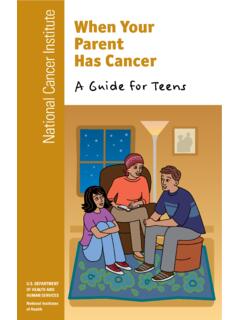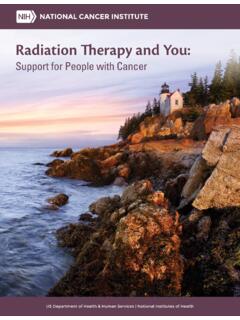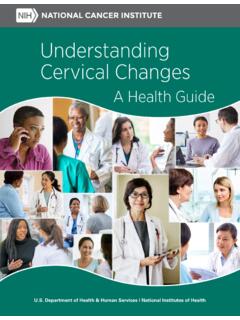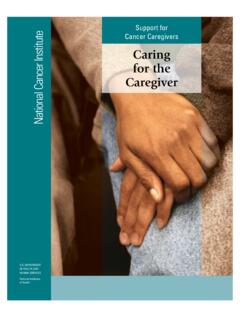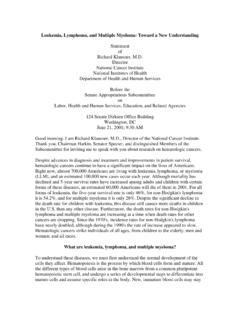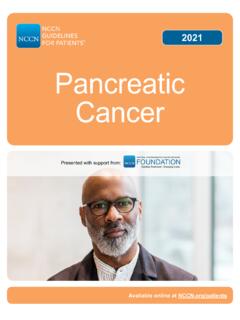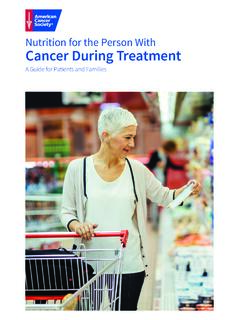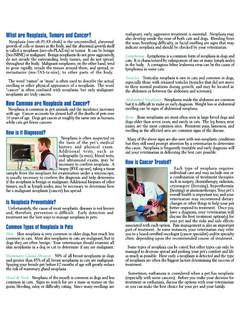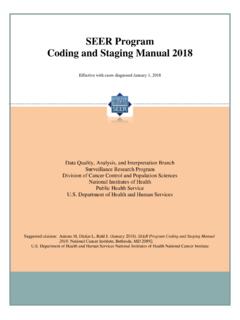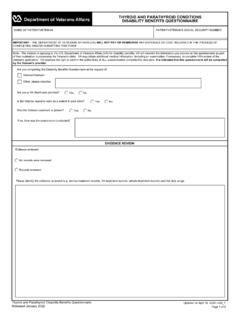Transcription of Life After Cancer Treatment
1 Facing ForwardLife After Cancer TreatmentNational Cancer DEPARTMENT OF HEALTH AND HUMAN SERVICESN ational Institutesof Healthb A Note About Cancer SurvivorsThere are millions of people in the today who are Cancer survivors. Three out of every four American families will have at least one family member diagnosed with Cancer . To help support survivors unique needs, the National Cancer Institute (NCI) formed the Office of Cancer Survivorship (OCS) in 1996. The office is dedicated to enhancing the length and quality of life of people with Cancer . OCS also promotes research that looks at the long- and short-term effects of Cancer and its Treatment . For more information about survivorship issues and OCS, visit online at would like to offer a sincere thank you to the extraordinary survivors who contributed to the development and review of this extends a special thanks to the following researchers for their pivotal work in the area of Cancer survivorship under NCI Grant No.
2 CA63018. Facing Forward was adapted from materials used in the study, Moving Beyond Cancer . n Patricia A. Ganz, , Professor, UCLA Schools of Medicine and Public Health and Division of Cancer Prevention & Control Research, Jonsson Comprehensive Cancer Center, Los Angeles, CAn Beth Leedham, , Clinical Psychologist, private practice, Encino, CAn Beth E. Meyerowitz, , Professor, Department of Psychology, University of Southern California, Los Angeles, CAThis booklet is also available in Spanish (visit or call 1-800-4- Cancer ). Este folleto tambi n se puede obtener en espa While I was having chemo, I quit doing almost everything. So when Treatment ended, the challenge for me was, what am I going to do now with my life ? What should I go back to doing? LENF acing ForwardLife After Cancer TreatmentNow that Treatment is over.
3 Many Cancer survivors have told us that while they felt they had lots of information and support during their illness, once Treatment stopped, they entered a whole new world one filled with new questions. This booklet was written to share common feelings and reactions that many people just like you have had After Treatment ended. It also offers some practical tips to help you through this time. Use this booklet in whatever way works best for you. You can read it from beginning to end. Or you can just refer to the section you need. This booklet shares what we have learned from other survivors about life After Cancer : practical ways of dealing with common problems and guidelines for managing your physical, social, and emotional health. When possible, we include specific information from research with Cancer Cancer is a major event for all who are diagnosed, it brings with it the chance for growth.
4 As hard as Treatment can be, many Cancer survivors have told us that the experience led them to make important changes in their lives. Many say they now take time to appreciate each new day. They also have learned how to take better care of themselves and value how others care for them. Others draw from their experience to become advocates to improve Cancer research, Treatment , and care. We hope that this booklet will serve as a resource and inspiration to you as you face forward to your life After ease of reading, rather than listing the many professionals that you may see as part of your medical care, you ll find the term doctor used in the booklet to describe all medical is a survivor?This booklet uses the term Cancer survivor to include anyone who has been diagnosed with Cancer , from the time of diagnosis through the rest of his or her life .
5 Family members, friends, and caregivers are also part of the survivorship experience. You may not like the word, or you may feel that it does not apply to you, but the word survivor helps many people think about embracing their lives beyond their of ContentsCongratulations on Finishing Your Cancer Treatment ..1 What Is Normal After Treatment ? ..1 Getting Follow-up Medical Care ..2 What Is Follow-up Care? ..3 Which Doctor Should I See Now? How Often? ..5A Survivor s Wellness Plan ..5 Talking With Your Doctor ..7 Questions About Your Follow-up Plan ..10 Guidelines for Follow-up Care ..11 Ways To Manage Physical Changes ..15 Fatigue ..16 Memory and Concentration Changes ..18 Pain ..20 Nervous System Changes (Neuropathy) ..23 Lymphedema or Swelling ..24 Mouth or Teeth Problems ..26 Changes in Weight and Eating Habits ..28 Trouble Swallowing.
6 29 Bladder or Bowel Control Problems ..29 Menopause Symptoms ..30 Body Changes and Intimacy ..32 Your Feelings ..37 Social and Work Relationships ..49 Reflection ..55 Appendix ..56 Financial and Legal Matters ..56 Resources ..57 Learning To Relax ..60viI thought when I d finished Treatment when they looked at my tests and they said it looked good I thought, OK, I m done. But now I m starting to realize that it s not over. JANE1 Congratulations on Finishing Your Cancer TreatmentThe end of Cancer Treatment is often a time to rejoice. You are probably relieved to be finished with the demands of Treatment and are ready to put the experience behind you. Yet at the same time, you may feel sad and worried. It s common to be concerned about whether the Cancer will come back and what you should do After Treatment ends, you may expect life to return to the way it was before you were diagnosed with Cancer .
7 But it can take time to recover. You may have permanent scars on your body, or you may not be able to do some things you once did easily. Or you may even have emotional scars from going through so much. You may find that others think of you differently now or you may view yourself in a different of the hardest things After Treatment is not knowing what happens next. Because the doctors and nurses never told me what to expect, I had very unrealistic expectations of wellness, and so did my family and friends. This led to a great deal of worry. BOBWhat Is Normal After Cancer Treatment ?Those who have gone through Cancer Treatment describe the first few months as a time of change. It s not so much getting back to normal as it is finding out what s normal for you now. People often say that life has new meaning or that they look at things differently now.
8 You can also expect things to keep changing as you begin your recovery. Your new normal may include making changes in the way you eat, the things you do, and your sources of support, all of which are discussed in this Follow-up Medical CareAll Cancer survivors should have follow-up care. Knowing what to expect After Cancer Treatment can help you and your family make plans, lifestyle changes, and important decisions. Some common questions you may have are:n Should I tell the doctor about symptoms that worry me?n Which doctors should I see After Treatment ?n How often should I see my doctor?n What tests do I need?n What can be done to relieve pain, fatigue, or other problems After Treatment ?n How long will it take for me to recover and feel more like myself?n Is there anything I can or should be doing to keep Cancer from coming back?
9 N Will I have trouble with health insurance?n Are there any support groups I can go to?Coping with these issues can be a challenge. Yet many say that getting involved in decisions about their medical care and lifestyle was a good way for them to regain some of the control they felt they lost during Cancer Treatment . Research has shown that people who feel more in control feel and function better than those who do not. Being an active partner with your doctor and getting help from other members of your health care team is the first you don t have health insurance, Medicare, or Medicaid, you may feel that some of the information in this booklet won t be helpful to you. You may have already struggled just to get treated and now see follow-up care as another battle. It can be hard to get care if you don t have good medical coverage, but you must make sure you continue to get the care you need especially now that Treatment is may be resources in your community to help you get these services.
10 Talk with your doctor, social worker, or the business office at your local hospital or clinic. There are also organizations listed in the Resources section on page 57 that may be able to help you with health care Is Follow-up Care?Once you have finished your Cancer Treatment , you should receive a follow-up Cancer care plan. Follow-up care means seeing a doctor for regular medical checkups. Your follow-up care plan depends on the type of Cancer and type of Treatment you had, along with your overall health. It is usually different for each person who has been treated for general, survivors usually return to the doctor every 3 to 4 months during the first 2 to 3 years After Treatment , and once or twice a year After that. At these visits, your doctor will look for side effects from Treatment and check if your Cancer has returned (recurred) or spread (metastasized) to another part of your these visits, your doctor will:n Review your medical historyn Give you a physical examYour doctor may run follow-up tests such as:n Blood testsn MRI or CT scans.
